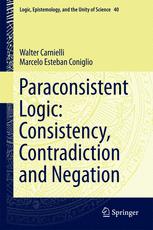

Most ebook files are in PDF format, so you can easily read them using various software such as Foxit Reader or directly on the Google Chrome browser.
Some ebook files are released by publishers in other formats such as .awz, .mobi, .epub, .fb2, etc. You may need to install specific software to read these formats on mobile/PC, such as Calibre.
Please read the tutorial at this link: https://ebookbell.com/faq
We offer FREE conversion to the popular formats you request; however, this may take some time. Therefore, right after payment, please email us, and we will try to provide the service as quickly as possible.
For some exceptional file formats or broken links (if any), please refrain from opening any disputes. Instead, email us first, and we will try to assist within a maximum of 6 hours.
EbookBell Team

4.0
86 reviewsThis book is the first in the field of paraconsistency to offer a comprehensive overview of the subject, including connections to other logics and applications in information processing, linguistics, reasoning and argumentation, and philosophy of science. It is recommended reading for anyone interested in the question of reasoning and argumentation in the presence of contradictions, in semantics, in the paradoxes of set theory and in the puzzling properties of negation in logic programming. Paraconsistent logic comprises a major logical theory and offers the broadest possible perspective on the debate of negation in logic and philosophy. It is a powerful tool for reasoning under contradictoriness as it investigates logic systems in which contradictory information does not lead to arbitrary conclusions. Reasoning under contradictions constitutes one of most important and creative achievements in contemporary logic, with deep roots in philosophical questions involving negation and consistency
This book offers an invaluable introduction to a topic of central importance in logic and philosophy. It discusses (i) the history of paraconsistent logic; (ii) language, negation, contradiction, consistency and inconsistency; (iii) logics of formal inconsistency (LFIs) and the main paraconsistent propositional systems; (iv) many-valued companions, possible-translations semantics and non-deterministic semantics; (v) paraconsistent modal logics; (vi) first-order paraconsistent logics; (vii) applications to information processing, databases and quantum computation; and (viii) applications to deontic paradoxes, connections to Eastern thought and to dialogical reasoning.